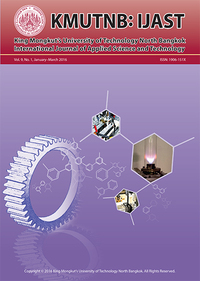Experimental Study of the Effect of Water Depth on the Productivity of Double Basin Solar Stills in Seawater Desalination
Main Article Content
Abstract
This research article studied the experimental of the effect of water depth on the productivity of double basin solar stills in seawater desalination. The experiment was carried out with the water depths at 1, 2, 3, 4 and 5 cm in order to obtain the appropriate water depth for purified water production during the day and at night and to analyze its efficiency. The study’s results revealed that the basin single and double slope solar stills at the water depth of 1 cm produced the maximum purified water at 2,285 ml/day and 2,620 ml/day, respectively. During the day, the production rates of purified water were 1,628 ml/day and 1,869 ml/day. At night, the production rates were 657 ml/day and 751 ml/day, respectively. The efficiency was 24.46% and 28.04%. However, at the water depth of 5 cm, the lowest purified water production rates were 1,044 ml/day and 1,389 ml/day. During the day, the production rates were 744 ml/day and 989 ml/day while at night it was produced 300 ml/day and 400 ml/day, respectively. The efficiency was 11.42% and 15.19%. The lower water depth provides better productivity than the higher water depth since the surface of water is less, so it is able to accumulate higher thermal energy obtained from the transmission of heat from the sun until it reaches the latent heat of vaporization and it evaporates into the glass surface. Then the condensation is fast made, so it provides a long period of desalination. This results in more production rate.


